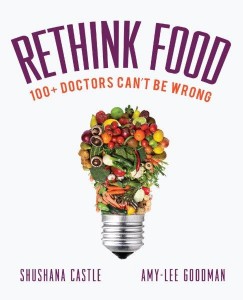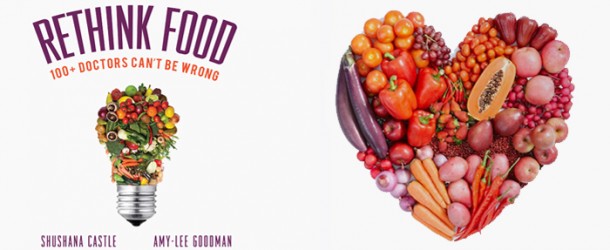 My colleagues and I in clinical medicine spend the vast majority of our time in operating rooms, emergency departments and outpatient offices largely cleaning up the wreckage of the “Standard American Diet.” Whether they choose to recognize it or not, the medical practice of every physician across the medical specialties – from internists to surgeons, from pediatricians to radiologists, from gastroenterologists to dermatologists, rheumatologists to public health and preventive medicine specialists – is largely focused upon repairing the damage resulting from what our patients are eating.
My colleagues and I in clinical medicine spend the vast majority of our time in operating rooms, emergency departments and outpatient offices largely cleaning up the wreckage of the “Standard American Diet.” Whether they choose to recognize it or not, the medical practice of every physician across the medical specialties – from internists to surgeons, from pediatricians to radiologists, from gastroenterologists to dermatologists, rheumatologists to public health and preventive medicine specialists – is largely focused upon repairing the damage resulting from what our patients are eating.
The time has come – for physicians and patients alike – to recognize that our food is chemically “alive.” The nutrients – or contaminants – from every meal and snack flow through our cells within minutes of eating, playing our un-coiled DNA like a piano, turn- ing on some genes and turning off others – inducing the production of some enzymes and inhibiting the production of others that determine who we are and how well we function. This means that every bite does matter. Food affects our functioning on the most fundamental levels, moment to moment, year in and year out – from determining our skin’s oil production to turning cancer-promoting genes on or off.
Eating a fast-food hamburger predictably sends a witch’s brew of denatured muscle proteins, saturated fats, pro-inflammatory arachidonic acid, endotoxin, and sialic acid Neu5Gc, growth-promoting hormones, along with antibiotics and bio-concentrated pesticide residues though the bloodstream. This toxic mixture is bathing every cell in the body within minutes of swallowing the meal and can promote cellular reactions that lead to inflammatory diseases in artery walls, inhibit the function of insulin recep- tors and promote the growth of several kinds of cancers.
The polluted river of pizzas, chili dogs and their ilk, flowing through one’s tissues creates a far different symphony of cellular reactions than an antioxidant-rich meal of a colorful fresh salad, hearty lentil stew, steamed green and yellow vegetables and fresh fruit for dessert. The phytonutrients in these foods generally promote healing and stability of tissues, and, thus, play a key role in the prevention and reversal of most of our common degenerative diseases.
We can look at any organelle in the cell such as the mitochondria, ribosomes, Golgi bodies or endoplasmic reticulum and see how flooding them with arachidonic acid, and other substances from animal-based foods might adversely affect its struc- ture and function. The interaction between our food and the genes on our chromosomes that determines the function of our cells is called nutrigenomics. Understanding that relationship gives us tremendous power to stop using foods to create disease states in our body and to start using each meal to foster deep and true healing.
The influence diet has on the cellular level is even more apparent when we look at the telomeres at the ends of our chromosomes, the tightly wound coils of our DNA that contain all our genetic information that let’s our cells function normally. Telomeres are special regions on the ends of the chromosomes that keep the chromosomes healthy and protect them from damage. Long, healthy telomeres are directly correlated with long, healthy lives; conversely, the shorter the telomere length, the shorter the lifespan.1 As we get older and subject ourselves to the chemical barrage of modern life, we can see under the electron microscope how eating a diet filled with free radicals and oxidizing agents damages our telomeres. When we eat food that abuses our chromosomes, the damage is akin to going outside in the snow without a jacket. The telomeres become damaged and shortened, and expose the DNA within the chromosomes to genetic injury that can affect every aspect of cellular function – and echo down the generations through every subsequent cell division. Conversely, we can see evidence under the same electron microscope of injured, shortened telomeres visibly healing and becoming longer as plant-based nutrients exert their restorative effects.
All this has profound implications for all practicing physicians, like dermatologists, most of who apparently still do not believe that their patient’s diet affects the health of their skin, especially in cases of acne. There are now numerous studies showing how cow’s milk products, with their powerful concoction of growth factors such as estrogens and IGF-1 can launch a cascade of reactions that can play a direct role in acne eruptions.
Of course, our diet alters everything in the skin, from blood flow that determines wound healing, to the lubricating quality of skin oils, to the populations of bacteria living down in the hair follicles. Since most skin conditions have a strong component of inflammation – which can be promoted by many factors in animal-based foods – dramatic improvements in skin conditions such as acne4, atopic dermatitis5, and psoriasis6 are predictably observed when the diet becomes one based upon whole, plant-based foods.
We find ourselves in a seminal time for medicine and public health as we recognize each individual’s power to largely determine the course of their health – and, thus, their lives – though their food choices. As physicians, nutritionists, and scientists, we must stop hiding behind the linguistic barrier of “Etiology Unknown” when it comes to most of health challenges in the Western world. As we grow ever more ravenous for a meat-heavy, fast-food diet, waistlines expand, children become obese, and the costs for diabetes and stroke care alone threaten to bankrupt our nation, we must stop overlook- ing the obvious. “It’s the food!” Physicians, government policy makers, food producers – and all of us – need to grasp that the molecules that we choose to flush through our cells on a daily basis hold the key to preventing and overcoming disease and to creat- ing abundant health and optimal function. Such a powerful tool, and it is available to everyone. “Let food be your medicine,” indeed. As the title of this book so aptly states, the time has come for scientists and physicians who want to effectively treat the cause of diseases – not just to deal with symptoms – to rethink food.
Reprinted by permission from RETHINK FOOD: 100+ Doctors Can’t By Wrong by Shushana Castle and Amy-Lee Goodman. Two Skirts Productions, LLC
We have free copies of RETHINK FOOD for five lucky Chic Vegan readers! Follow instructions below to enter. US resident only, please. Contest ends at midnight EST on May 4th. Good luck!

I think of food as health and as medicine. If I eat a whole food, plant-based diet, I feel healthy and I do not get sick!
I hope to rethink food as something I won’t obsess about.
I have been a vegetarian for almost 35 years. When I started, it was all about what I was not getting in meat products (cholesterol, immunizations that the animal got, etc) that colored my decision. As I have continued to investigate and gain awareness, my decision has become more about the benefits of eating plant-based (phytonutrients, flavinoids, etc.)
At first it was about being vegan but now it’s about being a healthy vegan and eliminating processed foods, anything with GMO’s, chemicals, etc.
vegan for life!
I’ve had to learn to think much more globally to understand the impact food has on the environment, the community and the world
A little over 2 years ago, I went vegan to lose weight. I was an obese pescetarian at the time. In the last several months, my thinking about food has undergone a paradigm shift. I now truly pay attention to the amount AND the quality of the food I eat. I am still vegan, because of compassion, and I am whole-foods plant-based no-oil, for my health.
And, I have lost 75 of the 100+ pounds that I need to lose!
I have learned to be more mindful about what I put in my body, to try to choose the foods that are most beneficial and nourishing. Sometimes I stumble, but I keep on going!
It wasn’t until I was fully vegan, that I realized that it wasn’t just about not eating animal products. I am aware of how much raising animals for consumption is ruining our planet in extreme ways. I frequently learn more and more online about how to be a healthy vegan and about ingredients to avoid when eating. My mind set on life itself has vastly changed from being a vegetarian in high school to a vegan in community college. I will never look back and only will tell those around me about the benefits and the need to be vegan, not just for yourself, but the animals and the planet.
I became vegan almost a year ago due to a bowel obstruction. After I changed my lifestyle I started to notice huge changes. Energy increased, weight stays off, an overall sense of better health. My 14 year old son noticed and also decided to be vegan. Now when I see people consuming meat and dairy or even at the grocery when I see it all I can think is that it is poison to our delicate bodies. Rethinking food is something that all should consider. It has changed my life!
When I first went vegetarian then vegan, I had to rethink food in terms of replacing the protein and nutrients from animal products and not just eating side dishes. I’ve since done a second round of rethinking in order to clean up my diet from processed foods and white flour + sugar
I now eat an oil free plant-based whole food diet
I embrace the vegan lifestyle but I can’t say the same about my family. I do feel much better on it but find it incredibly hard to maintain as I get a lot of resistance. I’m attempting to be vegan 3-4 times per week for dinner (lunch and breakfast on everybody’s own) and will gradually bump it to daily. I keep telling them about how much better I feel but I know it takes time and I’m trying to be a role model for being an older person no on medications.
I’ve been vegan for well over three decades. For me, rethinking food meant giving up all products containing modern wheat, occasioned by my reading “Wheat Belly” a year and a half ago. I never had a problem with gluten (it was my “meat” for a very long time), but I DO have a problem with a plant that spikes blood sugar as badly as it does, and that codes for novel proteins that cross the blood-brain barrier to bind with opiate receptors! If a plant is going to tell me how to feel, I’d rather smoke pot. Health and peace.
Shopping and buying local at the Farmer’s Markets helps me rethink food by buying the colors of the rainbow that are local.
Rethinking food has meant eliminating all processed foods and wheat and white flours.